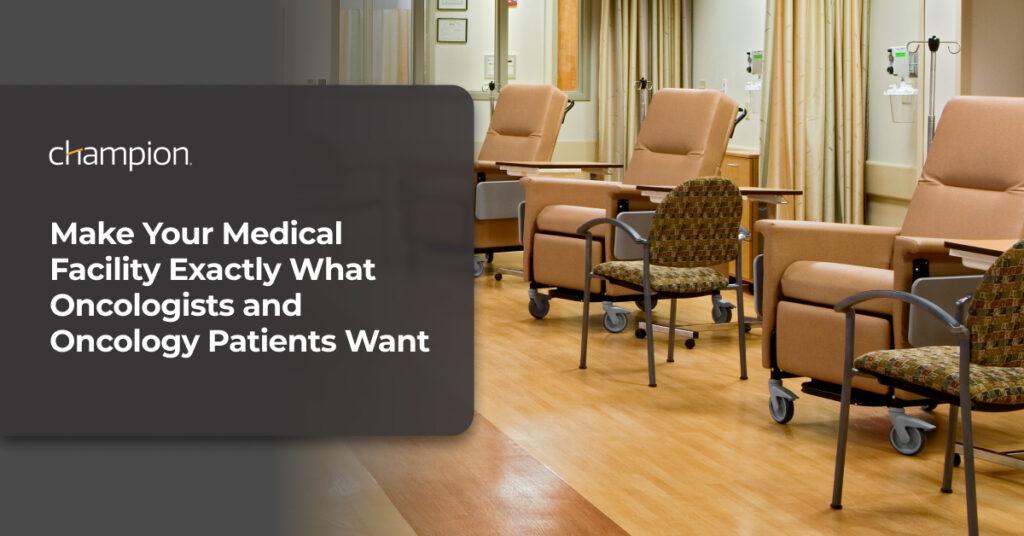
Make Your Medical Facility Exactly What Oncologists and Oncology Patients Want
It’s been said that you can’t please everyone, so you might as well please yourself. While the first part of this adage might be true, following the advice in the latter half is a sure-fire way to ruin your reputation in the medical field.
But when there are so many stakeholders to satisfy, how can it be possible to please all of them? It takes an effective, intuitive, and innovative leader to find smart ways (methods that won’t break the bank or burn out staff) and manageable compromises to ensure physicians and patients are equally cared for and feel equally valued.
In this blog, we examine both sides of the same coin. What do oncologists prioritize in an oncology clinic to ensure that patients receive the best treatments, and what do patients value most from their clinics and care? Discover what your team wants — and how to make it happen.
![]()
What Do Most Oncologists Care About Most?
Oncologists want clinics that offer cutting-edge therapies such as immunotherapy, targeted treatments, and access to clinical trials. High-quality diagnostic tools like genetic testing, advanced imaging, and molecular profiling are also critical for precision medicine.
Sign up to get the latest industry news and offers right in your inbox
Modern Treatment Systems:
Advanced Diagnostic Tools:
Cutting-Edge Imaging Technology:
|
But tools aren’t enough without a top-rated team. Oncologists prefer working in clinics where specialists (e.g., surgeons, radiation oncologists, pathologists, genetic counselors) collaborate seamlessly. This allows for multi-disciplinary comprehensive treatment plans that address all aspects of the patient’s cancer journey.
Clinics that support oncologists in staying up-to-date with the latest research, attending conferences, and participating in continuing medical education (CME) programs contribute to delivering the highest standard of patient care.
And patient care is arguably the primary reason oncologists do what they do. Therefore, oncologists want clinics to focus on holistic patient care, which includes pain management, psychological support, nutritional guidance, and rehabilitation services. This helps improve patient outcomes and overall quality of life during treatment.
Effective communication with patients and among the care team is essential. Oncology clinics should have systems in place for clear, ongoing communication about treatment plans, progress, and potential challenges.
Clinics that offer navigators to guide patients through the complexities of cancer care — such as financial counseling, transportation, and coordinating appointments — relieve stress on both patients and doctors, allowing oncologists to focus on treatment.
Oncologists also appreciate clinics that integrate palliative care early in the treatment process to manage symptoms and ensure patient comfort, as well as provide clear pathways for end-of-life care when needed.
Want to know how to best help your medical team? The aforementioned elements plus efficient workflow and administrative support work wonders. Oncologists value clinics with well-organized processes, such as streamlined patient scheduling, electronic medical records, and timely insurance authorizations. Efficient administrative systems allow oncologists to focus more on patient care rather than dealing with logistical issues.
Want to know how to best support patients at your facility? Keep reading.
|
Although December is not officially designated as a cancer awareness month, it features two important health observances related to cancer. One is Aplastic Anemia Awareness Month, which aims to raise awareness about aplastic anemia, and the other is Cancer-Related Fatigue Awareness Month, which focuses on increasing understanding of the fatigue experienced by cancer patients.
|
What Do Most Oncology Patients Care About Most?
Doctors know that state-of-the-art equipment and facilities are crucial for providing top-tier oncology care. But what do patients want?
When it comes to facilities, many patients have expressed the desire for things that alleviate their burden instead of adding extra steps to an already arduous process.
- An On-Site Pharmacy:
- Equipped to prepare and dispense specialized oncology medications
- Clean rooms for sterile preparation of chemotherapy drugs
- Laboratory Facilities:
- On-site labs for quick turnaround of blood tests and other analyses
- Specialized equipment for monitoring treatment effects and toxicities
While these additional conveniences make a difference, many oncology patients place greater value on compassionate and skilled medical staff, clear communication about their treatment plan, access to support services, and a comfortable and welcoming environment. Together, these elements can contribute to a positive patient experience and better outcomes.

Top 10 Factors That Matter Most to Patients
- 1. Compassionate, Patient-Centered Care: Patients appreciate when the clinical staff demonstrates empathy, listens to their concerns, and communicates clearly. This includes explaining complex medical information in understandable terms. Oncology care often involves challenging treatments, so patients value emotional support from healthcare professionals who are compassionate and available to address fears and anxieties.
- 2. Access to Comprehensive Care: Patients often value having access to a range of specialists, including oncologists, nurses, dietitians, mental health professionals, and social workers who work together to provide holistic care. Seamless communication between healthcare providers across different specialties is crucial, as it helps ensure that patients receive the best possible care without unnecessary delays or miscommunication.
- 3. Personalized Treatment Plans: Patients prefer treatment plans that are specifically designed for their unique medical situation, taking into account the type and stage of cancer, lifestyle, and personal preferences. Allowing patients to be active participants in their treatment decisions, including options for therapy and side effect management, is important for patient satisfaction.
- 4. Comfortable, Healing Environment: The physical environment, including waiting areas and treatment rooms, should be clean, calming, and comfortable. Amenities like comfortable seating, natural lighting, and quiet spaces can help reduce patient stress. Maintaining patient privacy during consultations, examinations, and treatments fosters a sense of dignity and respect.
- 5. Timely and Efficient Care: Patients highly value efficient scheduling, timely consultations, and prompt initiation of treatments. Long waiting times can increase anxiety, particularly for oncology patients who may have urgent needs. Being able to schedule and reschedule appointments easily through online systems or flexible office hours is important for patients who often have frequent visits.
- 6. Access to Cutting-Edge Treatments: Access to the latest treatments, clinical trials, and cutting-edge diagnostic tools can be reassuring to patients, knowing they are receiving state-of-the-art care. Many patients value having the option to explore alternative or complementary therapies alongside traditional treatments.
- 7. Support for Side Effect Management: Oncology treatments can have significant side effects. Patients value clinics that proactively address these issues with comprehensive symptom management plans, including pain relief, nausea control, and fatigue management. Offering resources for ongoing care, recovery, and monitoring after treatment concludes is essential for helping patients navigate their journey post-therapy.
- 8. Affordability and Transparency: Transparent discussions around the cost of treatments, insurance coverage, and payment plans are appreciated, helping reduce the financial stress associated with cancer care. Many patients value being informed about and having access to resources that provide financial support, such as grants, scholarships, or nonprofit assistance programs.
- 9. Patient Education: Patients value clinics that provide clear, accessible educational materials about their diagnosis, treatment options, and what to expect during the cancer journey. Many patients find comfort in connecting with others going through similar experiences, so offering support groups and counseling services is highly valued.
- 10. Family and Caregiver Support: Oncology patients often rely on family members and caregivers for emotional and logistical support. Clinics that involve caregivers in treatment discussions and provide resources to support them are highly appreciated.
Addressing each of these 10 aspects can significantly improve patient satisfaction and outcomes in oncology care settings.
![]()
Top Medical Seating for Oncology Treatments
This is where Champion’s expertise in medical seating becomes particularly relevant. Designed specifically for oncology patients undergoing chemotherapy and other infusion treatments, our medical recliners offer:
- Ergonomic design for patient comfort during long sessions
- Easy-to-clean surfaces to maintain a hygienic environment
- Adjustable positions to accommodate various patient needs and preferences
- Durability to withstand frequent use in busy clinics
- Features like built-in USB ports for patient convenience
The importance of comfortable and functional seating in treatment areas cannot be overstated, as patients often spend hours receiving infusions. By investing in these advanced technologies and equipment, including high-quality medical seating like Champion’s oncology medical recliners, oncology clinics can provide more accurate diagnoses, deliver more effective treatments, and significantly improve the overall patient experience.
This comprehensive approach to facility design and equipment selection helps ensure that patients receive the best possible care throughout their cancer treatment journey.
To view Champion’s entire portfolio of products, browse our digital catalog. Then, request a quote for your facility.
